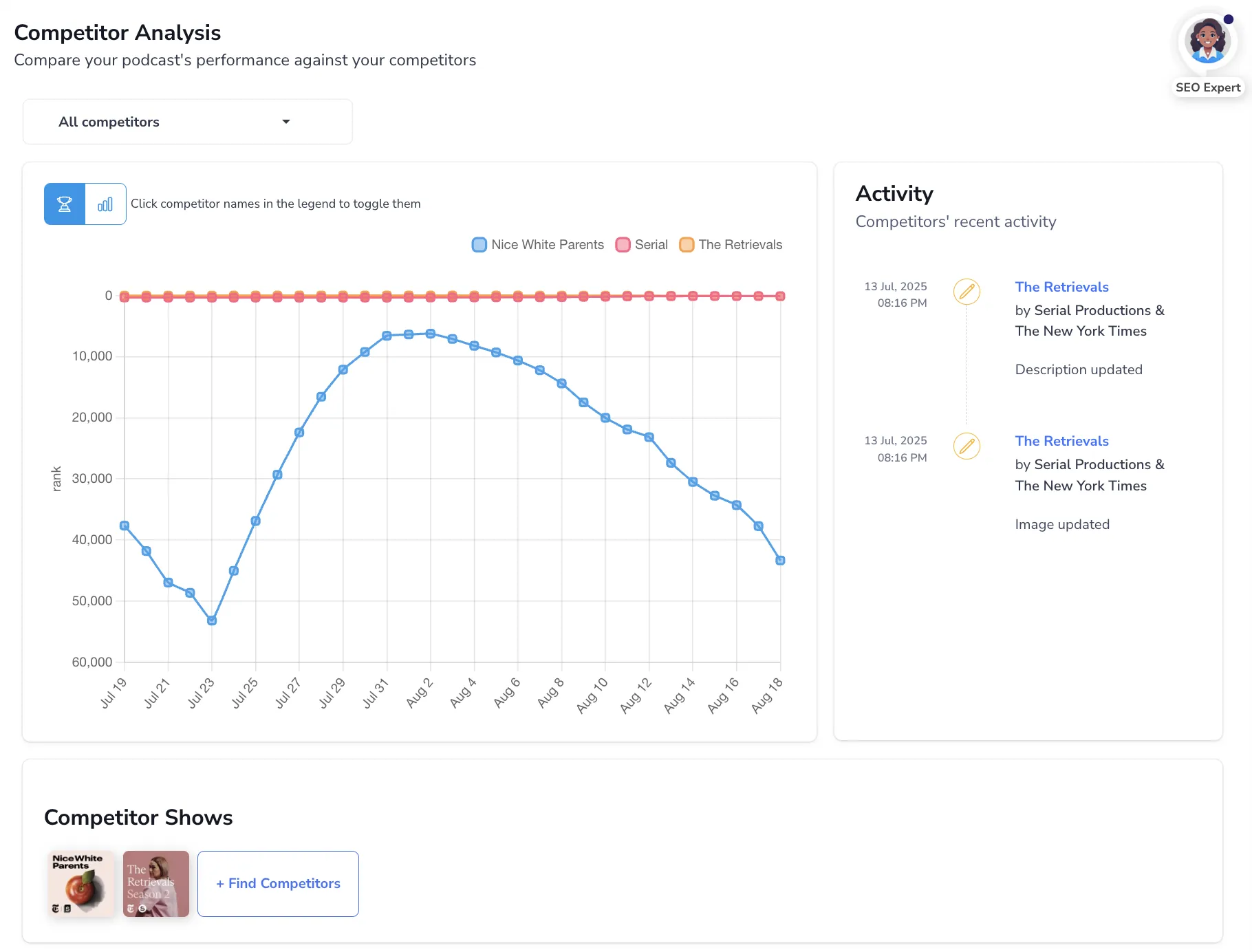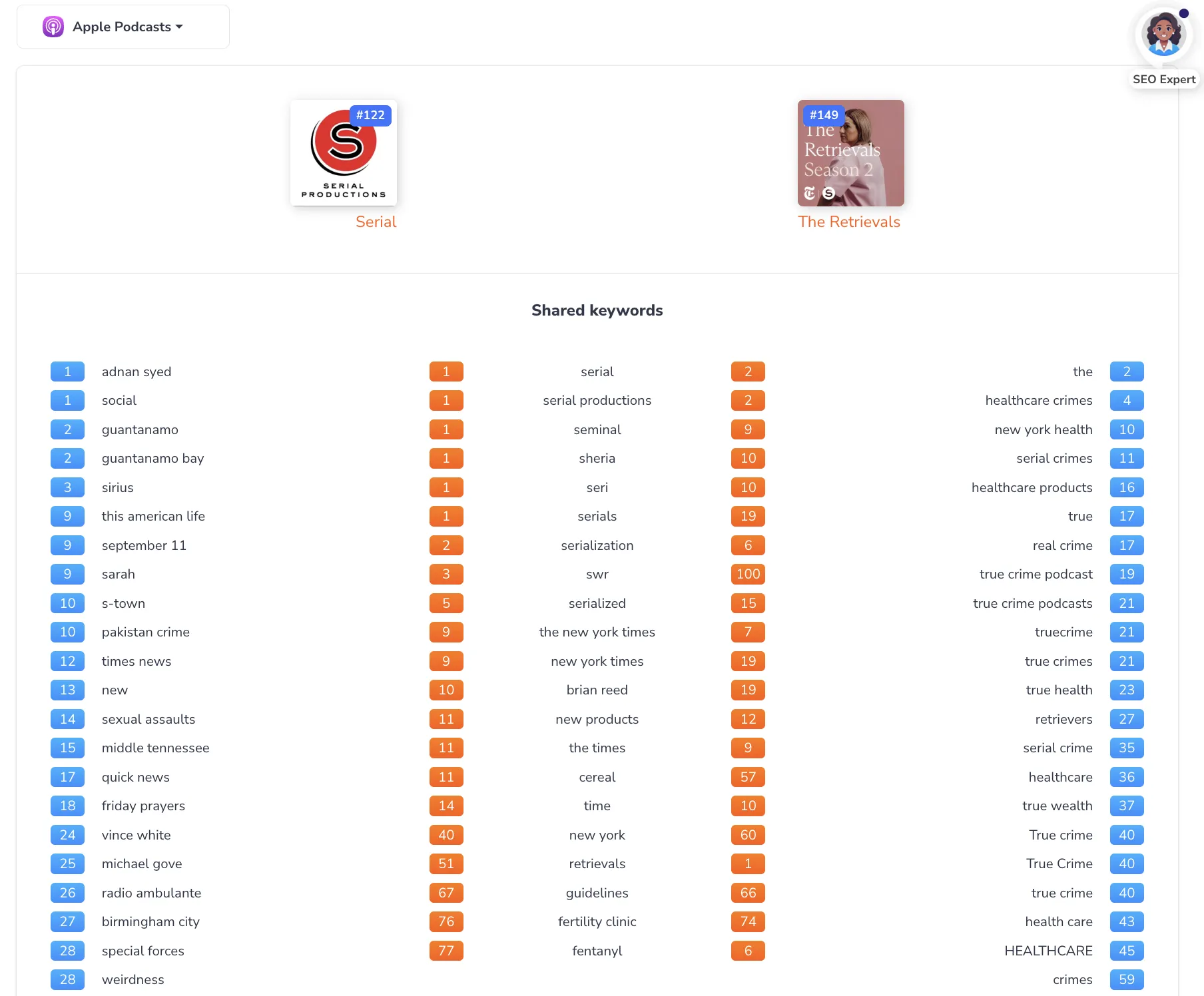Appearance
Competitor Analysis
Learn What's Working in Your Competitive Landscape
Competitor Analysis shows you exactly how your podcast stacks up against the competition and reveals what successful podcasts in your space are doing right. By understanding competitive patterns and opportunities, you can make strategic decisions that give your podcast a real advantage.

Two Ways to Analyze Your Competition
Competitive Landscape Overview
Get the big picture of how you're performing against all your tracked competitors at once:
- Competitive Positioning: See where you rank compared to all your tracked competitors over the past 30 days
- Performance Trends: Spot whether you're gaining ground or falling behind in your competitive set
- Market Context: Understand your position within your immediate competitive landscape
- Strategic Opportunities: Identify competitors you can realistically overtake with focused effort
Head-to-Head Deep Dive
Focus on one competitor for detailed strategic intelligence:

- Keyword Strategy Comparison: Discover which keywords you share, which ones they're winning that you're missing, and where you have unique advantages
- Content Activity Patterns: Track when they release episodes and update their podcast information
- Platform Performance: See how you compare across Apple Podcasts, Spotify, Amazon Music, and YouTube Music
- Strategic Learning: Understand what's working for successful competitors in your space
Understanding Your Competitive Position
Two Ways to Measure Success
Competitor Analysis shows your performance in two valuable ways:
- Your Actual Performance: Track your real ranking improvements over time to see if your optimization efforts are working
- Your Competitive Position: See whether you're ranked 1st, 2nd, 3rd, etc. among your competitive set, regardless of absolute numbers
Spotting Trends and Opportunities
The visual charts make it easy to identify what's happening in your competitive landscape:
- Performance Momentum: Quickly see if you're gaining ground or losing position relative to competitors
- Opportunity Windows: Identify when competitors have weak periods that create opportunities for your content
- Strategic Timing: Understand the best times to launch new content or optimization campaigns
The Systematic Approach to Competitive SEO Analysis
Step 1: Identify Your SEO Competitors
Not all competitors are created equal for SEO purposes. Focus on podcasts that:
- Share Your Target Audience: Shows your ideal listener might choose instead of yours
- Compete for Similar Keywords: Podcasts appearing for search terms you want to rank for
- Demonstrate SEO Success: Shows consistently ranking in top positions for relevant searches
Pro Tip: Study at least 10 competitors to identify patterns. Look for keyword themes that appear across multiple successful shows in your niche.
Step 2: Extract Their Keyword Intelligence
Analyze your competitors' metadata systematically:
- Podcast Titles: What keywords do they prioritize in their main title?
- Descriptions: Which terms appear repeatedly in their podcast descriptions?
- Episode Patterns: What keyword themes do they use consistently across episodes?
- Performance Correlation: Which of their keywords are driving the best rankings?
Three Types of Strategic Intelligence
For each competitor, you'll see exactly how your keyword strategies compare:
- Shared Keywords: Where you're both competing directly - see who's winning and by how much
- Their Unique Keywords: High-value keywords they're ranking for that you're missing entirely
- Your Unique Keywords: Keywords where you have no competition from this particular competitor
Step 3: Turn Intelligence Into Strategic Action
This competitive keyword analysis reveals immediate opportunities:
High-Impact Keyword Gaps Identify keywords where successful competitors consistently rank well, but you're not competing at all. These represent your biggest opportunity for quick SEO wins.
Content Strategy Insights
- Topics Successful Competitors Cover: Areas where they're capturing search traffic you could compete for
- Keyword Integration Patterns: How they naturally incorporate target keywords into titles and descriptions
- Content Themes That Work: Proven topics and angles that drive consistent search visibility
Strategic Positioning
- Competitive Advantages: Keywords where you're already outperforming competitors - double down on these
- Winnable Battles: Keywords where competitors have weak positions you can realistically overtake
- Long-term Opportunities: High-value keywords where building authority over time could yield significant results
Learning From Competitor Activity
Understanding What Drives Success
Track exactly what successful competitors are doing and when:
- Content Strategy: See their episode release patterns and frequency
- Optimization Efforts: Notice when they update titles, descriptions, or other podcast information
- Performance Correlation: Understand which activities seem to drive their ranking improvements
- Strategic Timing: Learn optimal timing for content releases and optimization efforts
Strategic Applications
Use competitor activity intelligence to:
- Optimize Your Content Calendar: Avoid oversaturated release days or fill gaps when competitors are quiet
- Learn From Success: Identify optimization strategies that consistently work for successful competitors
- Stay Proactive: Spot trends in your competitive landscape before they become widespread
- Time Your Moves: Plan your own optimization campaigns when they'll have maximum impact
Making the Most of Competitive Intelligence
Strategic Applications for Growth
Use competitive analysis to drive real improvements in your podcast's performance:
- Content Strategy: Identify content gaps where successful competitors aren't performing well, creating opportunities for your expertise
- Keyword Strategy: Discover proven keywords that competitors are using successfully, then optimize your own content around these terms
- Timing Strategy: Understand optimal timing for content releases and optimization efforts based on competitive patterns
- Differentiation Strategy: Find ways to stand out by offering value that competitors are missing
Setting and Achieving Competitive Goals
Competitive analysis helps you set realistic, achievable goals:
- Benchmark Performance: Understand what "good" performance looks like in your competitive landscape
- Progressive Targets: Set goals to outperform specific competitors rather than aiming for unrealistic jumps
- Market Context: Define success based on your competitive position and market opportunity
- Strategic Milestones: Track improvement relative to competitive performance over time
Best Practices for Competitive Success
Building Your Strategic Competitive Intelligence System
Quality Over Quantity: Focus on tracking competitors who truly compete for your target audience rather than trying to monitor everyone. Your goal is deep insights from relevant competitors, not surface-level data from everyone in your category.
Mix Performance Levels for Maximum Learning:
- Aspirational Competitors: Top-performing podcasts that represent your growth goals
- Peer Competitors: Shows at similar levels you can realistically overtake with focused effort
- Emerging Competitors: Newer shows that might be using innovative SEO strategies
Content Relevance Over Popularity: Prioritize competitors with similar content themes and target audiences over those that are only loosely related. A smaller, highly relevant competitor's keyword strategy may be more valuable than a massive show in an adjacent space.
Regular Strategic Reviews:
- Monthly: Quick competitive positioning checks and new keyword opportunities
- Quarterly: Complete reassessment of your competitor list as your podcast grows and your competitive landscape evolves
- After Major Changes: Review competitive landscape whenever you pivot content strategy or target new keyword themes
Developing Your Analysis Routine
- Weekly Check-ins: Spend 10-15 minutes weekly reviewing competitive trends and recent activity
- Monthly Deep Dives: Conduct comprehensive competitive analysis monthly to inform your strategic planning
- Event-Based Analysis: Pay special attention to competitor performance around major content releases or industry events
- Seasonal Planning: Use quarterly competitive landscape reviews to adjust your long-term strategy
Turning Analysis Into Action
The key to successful competitive analysis is moving from observation to strategic action:
- Keyword Strategy Updates: Use competitive keyword insights to refine your keyword targeting and content optimization
- Content Calendar Optimization: Plan your content releases and optimization campaigns based on competitive activity patterns
- Strategic Positioning: Adjust your podcast's positioning based on gaps and opportunities in the competitive landscape
- Performance Benchmarking: Set realistic goals and measure progress against competitive benchmarks
Integration with Your Growth Strategy
Connected Intelligence
Competitor Analysis works most effectively when integrated with your other optimization efforts:
- Keyword Strategy: Use competitive insights to inform which keywords to target and prioritize
- SEO Analysis: Add competitive context to your optimization recommendations for better strategic focus
- Timeline Monitoring: Track competitive progress alongside your own optimization efforts to measure relative success
- Strategic Planning: Build competitive intelligence into your overall podcast growth strategy
Long-term Competitive Advantage
The podcasts that grow most successfully use competitive analysis not just to copy what others are doing, but to identify opportunities others are missing. Regular competitive intelligence helps you stay ahead of trends, spot market gaps, and position your podcast for sustainable growth in an increasingly competitive landscape.
Getting Started: Begin with the multi-competitor overview to understand where you stand in your competitive landscape, then dive into head-to-head analysis with your most relevant competitors to identify specific opportunities for growth and differentiation.
